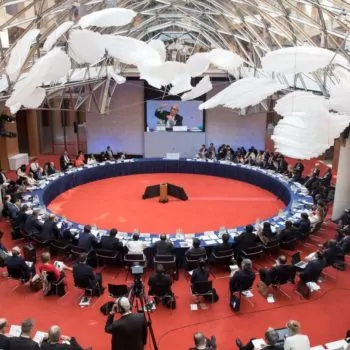Recent extreme weather events in the US, Canada, Europe and beyond have shown the high-income countries how vulnerable it is to climate change – a feeling that lower- and middle-income countries have known for years. With worsening climate impacts, money must be mobilised to ensure developing countries have the means to pursue clean development, to cope with climate risks and prepare for unavoidable loss and damage beyond adaptive capacity. Germany’s actions over the past decade on climate finance have established it as a leader with climate negotiations and commitments on climate finance at a critical moment. With decisive action at COP and as the incoming G7 chair, the new government can maximise the chances that the world avoids catastrophic climate change.
Here we set out five key actions for the German G7, spanning climate finance and the coordination of G7 economic policy.
Progress on the $100bn promise
Developed countries pledged in 2009 to provide $100 billion a year by 2020, but this has still not been achieved. The OECD estimate climate finance reached almost $80 billion in 2019; though around half of this is not “new and additional” as the original agreement envisaged. Responding to calls from vulnerable countries, Germany and Canada are co-chairing a process for developed countries to come up with a collective climate finance plan through to 2025, which is an important opportunity for Germany to move other countries to also contribute their fair share of this collective goal.
Germany is a clear leader on climate finance. It provided $4.8 billion in 2019; and was the leading country in terms of the increase in all public development finance in the prior decade, with a $17.4 billion increase over the period. At the G7 Summit in Cornwall this year, Germany said it would increase its climate finance by €2 to €6 billion a year by 2025 at the latest.
Germany as dealmaker at COP 26 and in the G7
Climate finance commitments are crucial to progress at COP26. In July, the V20 group of climate vulnerable countries called for a concrete minimum $500 billion delivery plan of additional 50:50 finance for adaptation-mitigation for the five year period 2020-2024, raising the stakes for donor countries to step up their finance pledges and to deliver a substantial acceleration at COP26. The (UK) President Designate of COP26, Alok Sharma, has acknowledged the climate finance pledge has become “a matter of trust”, and rich nations “must deliver now” on long-promised finance. Germany, taking over the G7 presidency next year, must use its diplomatic weight and ability to act as a mediator both at COP26 and the G7 to build trust and advance international solidarity. Alongside the obvious need to monitor against the Canada-Germany delivery plan, ensuring progress on new commitments on climate finance made this autumn will be key.
With less than two months to COP26, Germany can take steps to maximize the chances of persuading developing countries to take the shift to net zero seriously, and to ensure its finance tackles climate most-effectively. Specifically:
1. Influencing peers to step up with comparable commitments
Germany must make the case—especially with the US who helped initiate the $100 billion target—to step up efforts on climate finance, but also to bring along others like Canada, Spain and Australia who are not providing their fair share. To be meaningful and to achieve the trust of developing country partners, these efforts should be additional to existing aid and COVID-19 response efforts. Germany’s role to co-lead the development of a plan for how developed countries will meet and exceed the $100 billion climate finance pledge through 2025 is both a huge opportunity and increased visibility for German climate diplomacy—and Germany’s own record and scale means it is uniquely-placed to ask others to do more.
2. Transparency and focus of new commitments
Climate finance commitments and discussions have been undermined by opacity over amounts and measurement. Germany should set an example in both its commitment and reporting of climate finance. Its welcome recent announcement to increase financing to €6 billion a year by 2025 was unclear on whether resources are additional to existing development finance, on the amount to be made available annually between now and 2025, and on details such as the extent to which it will be adaptation-focused. Lower income countries have been clear that publicly funded and accessible adaptation finance is the priority, and announcements should be clear if they tackle these priorities or whether they are the much-less-valuable “leveraged” private finance for mitigation.
3. Finance effectiveness and evaluation
Climate finance already accounts for over a fifth of global aid. But there is little high quality evaluation evidence on its effectiveness. Governments cannot ignore potential trade-offs in spending that tackles climate alongside other objectives, and Germany should step-up efforts to monitor climate spending, including a common approach to reporting, and support evaluation efforts. Given that all development spending will need to be Paris-aligned, it should also ensure that climate concerns are integrated in all projects where it makes sense to do so.
In terms of Germany’s climate leader role, and as head of the G7 next year with the new government in place, some of its priorities will depend on the outcome of COP. But as well as the above areas, there are two further important areas of “no regret,” it should put high on the agenda.
Overall, the Germany G7 presidency in 2022 will need to become the driving force behind climate-focussed economic reform. Specifically:
4. Initiate global dialogue on carbon pricing and finally concretizing timelines for fulfilling G7 and G20 commitments to phase-out fossil fuel subsidies
Despite the urgency of climate change, many countries retain significant fossil fuel subsidies; and few price carbon anywhere near its true social cost. Still, there is a strong case for coordination of these policies between countries to ensure that production does not shift to high carbon environments, and to avoid the economic risk from border carbon adjustments. The G7 can begin and lead stronger coordination and dialogue about the inter-operability of carbon pricing – where it does exist – and on ways to better reflect the social cost of carbon.
5. Coherence across and mobilization of finance for global recovery initiatives
The G7 should cooperate to mobilise and unlock sufficient finance for a strong global recovery. This cooperation would include fully funding the COVAX initiative and reallocating SDRs to support recovery. It also includes the B3W initiative with its aims to “develop a new partnership to build back better for the world, through a step-change in our approach to investment for infrastructure, including through an initiative for clean and green growth.” This initiative has been characterized by the media as Green Marshall Plan for developing countries, although it remains to be seen where the money will come from.
As well as ensuring these initiatives are properly funded, the G7 will need to ensure they are coherent; developing countries need urgent financial and health system support for vaccines to deal with COVID-19 and are not in a position for these to be conditional on climate action. However, all longer-term funding should build a clean and green future. In this context, B3W should push for high standards and impactful investment to facilitate sustainable, green development. The easiest way to mobilise climate investment through the B3W, however, remains to be by recapitalizing development banks.
Germany’s actions over the past decade on climate finance have established it as a climate leader and with climate negotiations and commitments on climate finance at a critical moment. Working closely with the UK—as it relinquishes both the G7 and COP presidency—and resuming a stronger climate policy leader role within the EU, the new German government needs to provide international finance leadership across different contexts by taking an integrated approach. Germany’s government can take decisive action to maximise the chances that the world avoids catastrophic climate change.
This blog was originally published by CGD. It is part of a series by CGD and partnering institutions from Germany focused on presenting specific policy proposals for the next German government’s leadership on global development issues. Written by Jule Könneke and Ian Mitchell.


